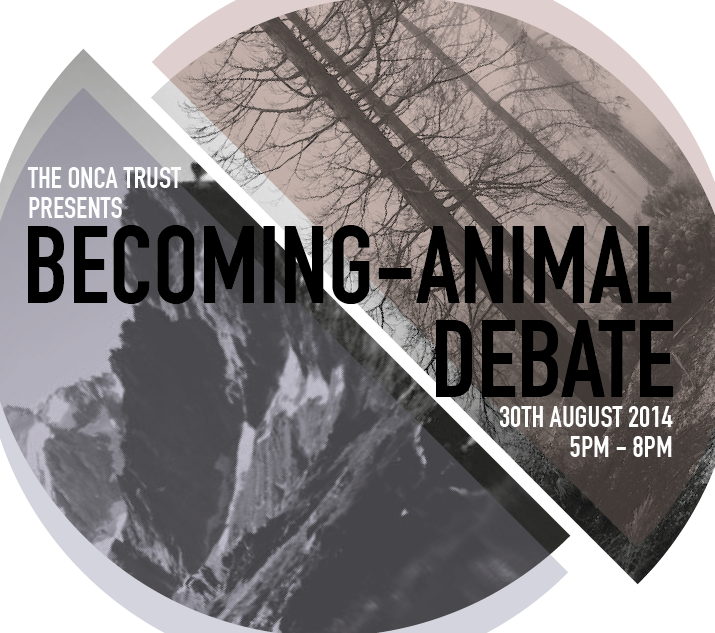We’ve got two poems to share with you today, inspired by the Becoming-Animal debate that took place last Saturday. Just a reminder of the challenge we set our creative writing team – attendance at the debate and our Exile exhibition, and then 24 hours to respond either in poetry or prose to the question of the relationship between becoming-animal and ecological activism.
Both of today’s poets deal with the relationship between activism, education and art. In her reflective comments on the debate, Emma Hughes suggests that it is part of the artistic work “to reconnect people and children to the natural world, in order for children to grow up feeling a responsibility to protect the planet and work to mitigate the damage being done”. Yet it isn’t the writer she voices in her beautiful poem “I took them to the woods” but the mother, not the forging of the linguistic fantasy but the craft of reality, that of bringing up a child. Emma chose to respond to the heated discussion about how to make real change by representing a parent doing just that. Her poem explores the exhilaration and worry implicit in any decision made for the family that goes against social norms and civilised safety. We feel in it both the joy of wilderness education and the instinctive maternal concern for a child “becoming-animal”; adding another layer of complexity to the idea that to become animal is to better understand ourselves. In philosophy this may be all very well, but for a child who must also be brought up human?
Miranda Sue Lethbridge has taken an entirely different approach, questioning the relationship between writing with an explicitly moral message, her poem is a lighthearted and yet philosophical consideration of the relationship between humanity and the meanings we make of the natural world.
I took them to the woods
It was my decision,
as if I created them again,
didn’t give them a choice.
Right from naming them,
deciding which aunt
could hold them, and which
could not, I’d shaped them.
Now I reshape them.
We camped out
for the summer’s warm months.
The first night in the tent
was hot, and the beds
not as comfy as I’d hoped.
In the morning I found
the children’s sleeping bags
curled by the fire.
I called them to breakfast,
their last with milk.
I have so many food supplies,
and an arrangement with the farmer,
who’d leased me the land,
for deliveries until my garden
was established. But we
are going to do things differently.
The children aren’t interested
in building the cabin.
They roam for hours,
bringing back stories of old nests
and tiny skeletons. They carry nothing,
no water bottles, no food, no toys.
Our clothes have assumed one colour and texture.
The children can be bribed
to pound them in the tiny stream
that runs from the spring.
I shiver to think of washing
in that water come the winter,
but even now we smell Autumn approaching
the children’s hard feet do not find their shoes,
and their smell is gentle, their hair
only a tang of wet coat when it rains.
I listen to the rustlings and calls each day,
amused by the children’s desire to blend
with the woods, and glide amongst
the small creatures. Sometimes I need
a break from building and gardening,
and walk the faint trails.
I find small piles of coloured stones,
and strung feathers.
The supplies are holding out well,
lasting far longer than expected.
I’ve had my early croppers,
and the over-winter vegetables
are well established.
The children eat sparsely at meals,
instead bringing me roots and berries,
a handful at a time, the rest staining their lips.
I think of Winter, and wonder if then
they will be contained by the cabin
and let me hold them.
— Emma Hughes
ANIMAL Human – Human ANIMAL
When did it happen
the split, the divide?
We’re really just one
deep down inside.
Our planet so delicate
under its skin.
In fact soft and gooey
deep down within.
We pillage and rape it
near through to the core.
But being human, today
we always want more.
Are we the disease
of this wonderful place?
In being human, today
have we all lost our grace?
And – is this just word play
a poet’s thoughts on the page,
or will you read on
and try to engage?
By being human, today
we all have a voice.
Each single one of us
makes our own choice.
And – this word ANIMAL
truly, what does it mean,
so many definitions
perhaps something unseen?
Food and water, shelter, love
is all we actually need.
But being human, today
perpetuates greed.
Take a step outside,
go for a walk
and using your senses
forget about talk.
Head for green spaces
watch swaying trees:
big, strong and beautiful,
listen to the leaves.
Is this becoming ANIMAL
picking blackberries from a hedge
a connection to the natural world,
not a divide or an edge?
One small step towards
a return to your roots.
Even if you don’t possess
the latest hiking boots.
It’s not too late
of that this poet is sure,
and as I finish this
I’ll walk out the door.
In my Birkenstocks J
— Miranda Sue Lethbridge
—
Share on Twitter /
Share on Facebook
Posted on September 10, 2014
Categories: O N C A Updates
→ Becoming-Animal Debate – Part Two
← Becoming-Animal Debate – Part Four
